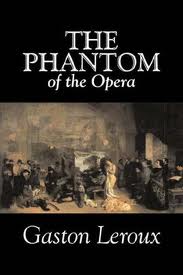The Phantom of the Opera by Gaston Leroux
Reviewed by Keri

Ratings Explanation:
Language: A couple of common swear words.
Violence: Eric has violent tendencies from living a life rejected by human kind. He feels little compassion for other and does not hesitate to kill them if they stand in his way. In his past, Eric learned methods of torture and killing which he uses on others in Paris. He poisons some of the help who have witnessed him. He constructs a torture chamber which gives the illusion of being trapped in a desert without water. The only way out is a rope and and iron tree on which to hang oneself. Guns are also used as protection against the Phantom.
Adult Themes: Christine’s father dies when she is still young. She misses him terribly. The Phantom, Eric, was mistreated even by his own parents. His mother made a mask for him to wear because she could not stand to look at him. He spent most of his young life traveling to fairs to be on display. He was eventually sold to royalty and allowed to fulfill every mad whim for amusement. He was also used as an assassin. Because of his incredible talent for building, Eric was also used to build palaces with secret entrances and passages. This also put his life in jeopardy because the owner did not want anyone to know of the building’s secrets or of the builders talents. He was ordered to be killed but saved by a Persian. In the end he escaped to Paris. Unfortunately, he had already developed a strong hatred toward the human race for their inhumane treatment of him throughout the years.
Synopsis
The Paris Opera House is rumored to be haunted by a ghostly phantom with the head of a dead man. The new managers are determined to dispel this rumor and get on with business as usual. Unfortunately, the Phantom has other plans. He has fallen in love with the young Christine Daee, the daughter of a great violinist and an up and coming singer in the Opera’s chorus. Before he died, Christine’s father promised to send her the Angel of Music, who would teach her the great secrets of music. When she hears the Phantom’s voice in her dressing room one night, Christine believes the Phantom to be the Angel of Music that her father has sent. The Phantom promises to teach her. Christine listens to his guidance and greatly improves her voice. One night the Phantom provides an opportunity for Christine to sing a solo. She brings the house down with her spectacular performance. Ironically an old childhood friend, Raoul, is also at that performance. When he sees Christine, he is charmed by her beauty and flooded with happy images from the past. Raoul is determined to make her acquaintance again. The Phantom is very protective of Christine and discourages her from seeing Raoul. Raoul however is not so easily deterred. He continues his attempts to be with Christine. One night he hears a strange voice in her dressing room, after which she quickly leaves and walks past Raoul standing in the doorway. Raoul enters the dressing room and finds no one. He is intrigued by this stranger that is turning Christine into only a shell of what she once was. Raoul finally triumphs. Christine allows him to see her but, only at the Opera House. They run up to the tallest tower and there she tells him of the Phantom named Eric. Raoul is very concerned for her safety and begs her to escape with him. Christine tells Raoul she wishes for nothing more but must wait until after one last performance. She explains that the Phantom has taken her to his lair under the Opera House. In curiosity she removed his mask. In anger, the Phantom made Christine promise to marry him. He has allowed her this one last outing and performance before he takes her underground with him forever. Raoul is surprised to find some compassion in Christine towards this madman and demands that she leave with him instantly. Christine refuses saying she must complete this last performance first. Raoul reluctantly allows her to do so. During the entire performance, he closely watches his love and waits for their planned escape. The Phantom has heard of the young lovers plan and takes Christine during the performance. Mad with worry, Raoul runs to the managers looking for help. There he finds a Persian who claims he can help him find his lost love. The Persian knew the Phantom, Eric, before he came to live at the Opera House. Raoul accepts his offer and follows him through the dangerous depths of the Opera House. After many encounters with the Phantom’s ingenious traps, the young lovers are brought together again. In the end, the Persian is left to tell the sad ending of the Phantom’s life. The musical genius, who was despised by all of humanity for his deformed face, was finally shown love and acceptance by a young girl and then allows her to leave. Eric feels some relief from his life’s curse and dies alone.
I have loved the music and have seen the movie but never read the book. Although the story line was familiar, I had no idea that the author, well known for his mysteries, wrote this as a real life mystery. Apparently the falling chandelier really did happen, injuring several spectators and killing one. This intrigued Leroux who obtained plans for the Opera House which revealed secret chambers and even an underground lake. The story was not a big hit in Leroux’s day. Wouldn’t he be surprised to see what has become of his story today! I really enjoyed his point of view as an inspector looking at the case from the different angles of the characters as he collected interviews and testimony on the Phantom. A definite classic.








